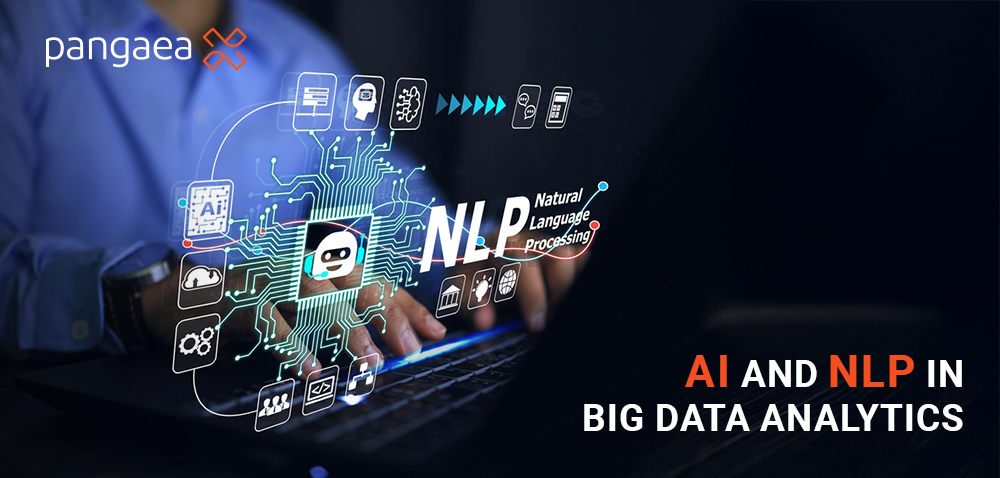The Future of AI And NLP in Big Data Analytics

Table of Contents
1. Understanding NLP: The Language of Machines
2. How AI and NLP Work Together in Big Data
3. Real-World Applications of AI and NLP
4. Freelancing in the AI-NLP Boom
5. The Future of AI and NLP in Big Data
6. Conclusion
Big Data is growing at an unprecedented rate, with vast amounts of structured and unstructured data being generated daily from social media, financial transactions, IoT devices, and digital interactions. However, without advanced analytical tools, this data remains an untapped resource. Artificial Intelligence (AI) and Natural Language Processing (NLP) have emerged as game-changers, enabling businesses to extract meaningful insights from massive datasets. AI detects patterns, NLP deciphers human language, and together they
are revolutionizing data analytics.
This blog delves into the impact of AI and NLP in Big Data, their working mechanisms, real-world applications, challenges, and the growing freelance opportunities in this fast-evolving field.
Understanding NLP: The Language of Machines
Natural Language Processing (NLP) is a branch of AI that enables computers to understand, interpret, and generate human language. It plays a crucial role in processing unstructured text data, such as customer feedback, emails, and social media posts, which traditional tools struggle to handle. According to Expert.ai, nearly 80% of enterprise data is unstructured, making NLP essential for extracting valuable insights. Key NLP applications in Big Data include:
- Sentiment Analysis: Understanding consumer emotions from reviews and social media.
- Text Summarization: Condensing lengthy documents into concise, meaningful summaries.
- Chatbots & Virtual Assistants: Enhancing customer interactions through intelligent conversations.
- Language Translation: Breaking down communication barriers with real-time translations.
With rapid advancements in machine learning, NLP is evolving to understand complex language patterns, idioms, and even sarcasm, making it more powerful than ever.
AI’s Role in Big Data Analytics
Artificial Intelligence (AI) serves as the backbone of Big Data Analytics, leveraging machine learning (ML) and deep learning to process vast datasets efficiently. Whether dealing with structured (sales data, financial records) or unstructured (video, emails, social media) data, AI can extract trends and predict future outcomes. Some major AI-driven analytics applications include:
- Predictive Analytics: Forecasting trends in finance, healthcare, and retail.
- Anomaly Detection: Identifying fraudulent activities in banking and cybersecurity.
- Automation: Streamlining repetitive tasks like data entry and customer inquiries.
- Personalization: Tailoring recommendations in e-commerce and entertainment.
AI-driven analytics empowers businesses to make faster, data-driven decisions, leading to improved efficiency and competitive advantage.
How AI and NLP Work Together in Big Data
Artificial Intelligence (AI) and Natural Language Processing (NLP) function as complementary forces in Big Data Analytics. While AI identifies patterns and correlations in structured datasets, NLP processes unstructured text data by interpreting language and sentiment. Together, they enable businesses to extract deeper insights and make more informed decisions. For example:
- AI can analyze purchase data, while NLP scans customer reviews to gauge satisfaction.
- AI detects spikes in financial transactions, and NLP monitors news sentiment to assess potential market impacts.
- AI predicts stock market fluctuations, and NLP analyzes financial reports for additional insights.
- AI automates fraud detection by analyzing transaction behaviors, while NLP deciphers customer complaints and regulatory filings to identify risks.
- AI streamlines healthcare diagnostics by analyzing medical images, while NLP processes doctor’s notes and patient histories for a comprehensive understanding.
- AI enhances cybersecurity by detecting suspicious activity patterns, and NLP helps interpret threat reports and security logs for proactive threat mitigation.
By merging AI’s computational power with NLP’s language comprehension, businesses gain a holistic view of their data, leading to better decision-making and strategic planning. The integration of AI and NLP also fuels advancements in chatbots, virtual assistants, and recommendation systems, further optimizing customer experiences and operational efficiencies. As these technologies evolve, their collaboration in Big Data Analytics will continue to drive innovation and uncover valuable insights across industries.
Real-World Applications of AI and NLP
As businesses and industries continue to embrace digital transformation, AI and NLP are playing a crucial role in reshaping how data is analyzed and utilized. These technologies allow organizations to process vast amounts of structured and unstructured data, providing actionable insights that drive efficiency and innovation. From automating repetitive tasks to improving decision-making, AI and NLP are revolutionizing various sectors.
AI and NLP are already transforming industries across the globe. Some notable applications include:
- Healthcare: AI predicts disease outbreaks, while NLP extracts insights from patient records and medical research.
- Finance: AI analyzes stock market trends, and NLP scans financial news to determine investor sentiment.
- Retail: AI studies customer behavior, while NLP powers virtual shopping assistants and sentiment analysis.
- Legal & Compliance: NLP automates contract analysis and ensures regulatory compliance.
- Cybersecurity: AI detects fraud, and NLP analyzes phishing attempts and security threats.
AI and NLP have become indispensable tools for modern businesses, significantly improving operational efficiency and decision-making. Their ability to process and analyze data at scale enables companies to stay ahead of trends, enhance customer experiences, and mitigate risks more effectively. As these technologies continue to evolve, their applications will expand, unlocking even greater potential across industries.
Freelancing in the AI-NLP Boom
As demand for Artificial Intelligence (AI) and Natural Language Processing (NLP) expertise grows, freelancing opportunities are booming. Businesses seek AI model developers, NLP specialists, and data analysts to optimize their analytics strategies. Platforms like Pangaea X bridge the gap by connecting freelance data analysts with AI expertise to businesses needing data-driven solutions. Companies can leverage Pangaea X to find top-tier professionals skilled in AI, NLP, and Big Data, ensuring they gain actionable insights from complex datasets.
Some high-demand freelance projects include:
- Building Chatbots: Developing AI-powered customer service assistants.
- Creating Sentiment Analysis Tools: Analyzing brand reputation and customer feedback.
- Developing AI-Powered Predictive Models: Assisting businesses in forecasting trends.
Essential Skills for Freelancers:
To succeed in AI and NLP, freelancers need strong technical skills and a deep understanding of data processing. Companies seek experts who can build efficient models, automate workflows, and derive meaningful insights from Big Data.
- Programming: Python (NLTK, SpaCy, TensorFlow, PyTorch).
- Big Data Tools: Hadoop, Spark, Apache Kafka.
- Cloud Computing: AWS, Google Cloud for data storage and model deployment.
- Multimodal AI: Integrating text, images, and audio data for enhanced analytics.
- Ethical AI: Ensuring fairness, transparency, and data privacy.
Freelancers specializing in AI and NLP can earn between $60–$200 per hour, while entry-level tasks such as data labeling start at $20–$40 per hour. With businesses increasingly outsourcing AI projects, skilled professionals can capitalize on this growing demand.
Challenges and Ethical Considerations
As AI and NLP become more widespread, ensuring responsible and fair implementation is crucial. Businesses must address key issues to build trust and maximize the benefits of these technologies.
- Bias in AI Models: Biased training data can lead to unfair outcomes.
- Data Privacy Concerns: Handling sensitive data must comply with GDPR and other regulations.
- Scalability Issues: AI-NLP models must efficiently process ever-growing datasets.
- Interpretability: Making AI-driven decisions more transparent and understandable.
Future developments will focus on mitigating these challenges, ensuring ethical AI deployment, and improving model accuracy and fairness.
The Future of AI and NLP in Big Data
As Artificial Intelligence (AI) and Natural Language Processing (NLP) continue to evolve, we can expect transformative advancements that will reshape industries. Some key trends shaping the future include:
1. Conversational AI & Advanced Chatbots
With improvements in NLP, chatbots and virtual assistants will become even more sophisticated, understanding complex queries and responding in a human-like manner. Businesses will deploy AI-driven chatbots for customer support, reducing the need for human intervention.
2. Explainable AI (XAI) & Transparency
One of the biggest challenges of AI is its ‘black-box’ nature, making decision-making processes difficult to interpret. Explainable AI (XAI) aims to make AI more transparent, providing insights into how decisions are made, particularly in high-stakes industries like healthcare and finance.
3. AI-NLP-Powered Automation
Organizations will leverage AI and NLP to automate data processing and knowledge extraction, reducing manual efforts in research, document analysis, and reporting. This will be particularly useful in legal, healthcare, and academia.
4. Multilingual NLP & Globalization
AI-powered translation models will improve, allowing businesses to cater to global audiences. NLP advancements will enable seamless communication across languages, benefiting international businesses, governments, and content creators.
5. Enhanced Personalization in Marketing
AI and NLP will refine targeted marketing strategies by analyzing user behavior and sentiment. Brands will deliver hyper-personalized content, improving customer engagement and conversions.
Conclusion
Artificial Intelligence (AI) and Natural Language Processing (NLP) are revolutionizing Big Data Analytics by transforming vast, unstructured datasets into actionable insights. Whether in healthcare, finance, retail, or cybersecurity, these technologies are driving efficiency and innovation. With the rise of AI-powered automation and personalized experiences, businesses are leveraging AI and NLP to stay competitive. For freelancers, the AI-NLP boom presents lucrative opportunities to develop cutting-edge solutions. Platforms like Pangaea X enable businesses to connect with skilled AI and NLP freelancers, ensuring they can harness the full potential of Big Data. While challenges such as bias and data privacy remain, advancements in ethical AI and model transparency will shape a future where Big Data is not just analyzed but fully understood and utilized.
Get your data results fast and accelerate your business performance with the insights you need today.



